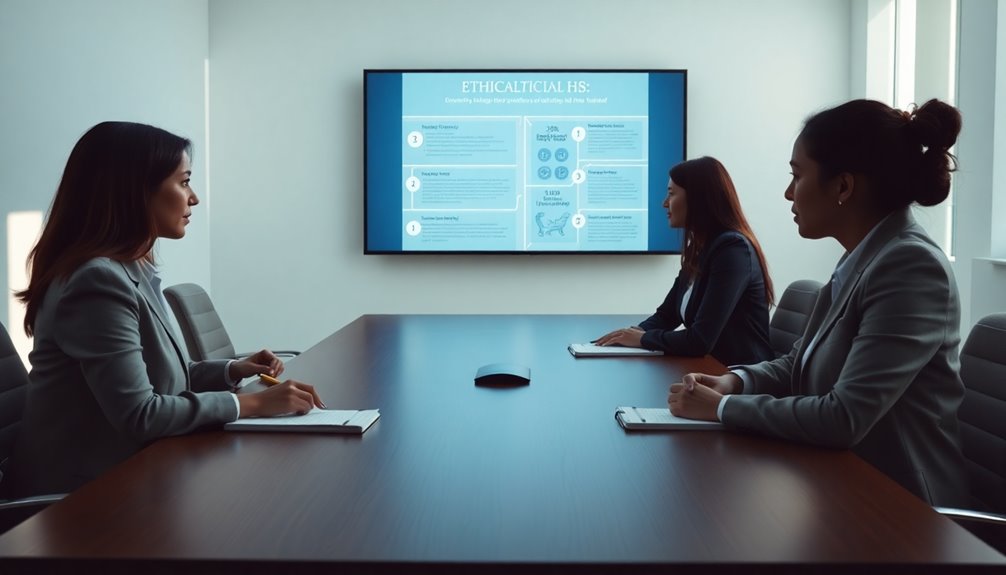When preparing for an HR manager interview, expect questions that highlight your recruiting approach and conflict resolution skills. You'll need to showcase your experience with team dynamics, emphasizing your unique management style and ethical considerations. Be ready to discuss metrics like turnover rates that align with organizational goals and how you've used these insights in past roles. Sharing specific examples, like successful cost-reduction initiatives, will also strengthen your position. Knowing these essential questions will set you up for success, and there's more to uncover that could give you an edge in the process.
Key Takeaways
- Discuss your recruiting approach and methodologies for selecting candidates that align with the organization's culture and goals.
- Provide examples of how you manage conflict within teams and your strategies for fostering cooperation.
- Differentiate between a group and a team, emphasizing the importance of collaboration in achieving organizational objectives.
- Highlight your experience with cost-reduction initiatives that maintained or improved productivity within teams.
- Share your understanding of HR metrics and how they inform decision-making to enhance employee performance and engagement.
Key Interview Questions

When preparing for an HR manager interview, you'll want to focus on key questions that reveal your qualifications and approach to managing people.
Start by anticipating questions about your recruiting approach—how do you source and select candidates?
Be ready to discuss your conflict resolution skills; how do you identify and resolve team conflicts?
You should also differentiate between a group and a team, as this showcases your understanding of collaborative dynamics.
Highlight your experience with cost-reduction initiatives while maintaining productivity, and be prepared to discuss your strategies for fostering team cooperation.
These questions not only assess your technical skills but also gauge your interpersonal abilities, essential for a successful HR manager.
Experience and Background

Your experience and background play an essential role in demonstrating your qualifications for an HR manager position.
You'll want to highlight your years of experience in various HR roles, emphasizing any leadership positions you've held. Discuss specific projects where you've implemented successful strategies, such as cost-reduction initiatives or team-building efforts.
Don't forget to mention your educational qualifications, as they can reinforce your expertise. Share your unique management style and how it has positively impacted team dynamics.
Be prepared to talk about your recruiting methods and conflict resolution skills, showing how you've effectively addressed challenges in the workplace.
This information not only showcases your capabilities but also aligns with the expectations for an effective HR manager.
Behavioral Insights

Highlighting your experience and background naturally leads to discussing behavioral insights, which are crucial for understanding how you handle diverse workplace situations.
Employers often seek specific examples that illustrate your management style and adaptability. When asked about challenging colleagues, describe how you navigated the situation to foster cooperation.
Focus on your traits that drive organizational success, emphasizing your conflict resolution skills. Share a successful project where your leadership made a difference, and highlight how you motivated your team.
It's essential to connect your past experiences with the demands of the HR role you're pursuing, showcasing your ability to create a positive work environment and resolve issues effectively. Developing cultural intelligence not only enhances your adaptability but also empowers you to lead diverse teams more effectively.
This approach not only demonstrates your qualifications but also your capacity to grow within the organization.
Ethical Considerations

Ethical considerations play a critical role in the HR manager's responsibilities, as they directly impact the organization's integrity and employee trust. When you're faced with ethical dilemmas, it's crucial to navigate them with transparency and fairness.
For instance, if you encounter a situation involving job elimination, you must communicate honestly with affected employees while ensuring compliance with company policies. Additionally, you'll need to address any unethical behavior swiftly and decisively, fostering a culture of accountability.
Furthermore, promoting diversity and inclusion requires you to confront biases and advocate for equitable practices. By prioritizing these ethical considerations, you not only uphold the organization's values but also enhance employee morale and commitment.
HR Metrics and Analytics

Effective HR metrics and analytics are essential for measuring the success of human resource initiatives and making informed decisions.
You'll need to identify key metrics that align with your organization's goals, such as employee turnover rates, time-to-hire, and employee engagement scores.
Familiarity with HR software and data analysis tools is vital, as these help you gather and interpret data effectively.
Don't forget to leverage these insights to drive improvements in employee performance and overall organizational efficiency.
When discussing your experience in interviews, emphasize specific examples where you used data to inform decisions or implement changes.
Highlighting your ability to analyze and act on HR metrics will demonstrate your value as a strategic partner in the organization.
Current Trends in HR

Maneuvering the ever-evolving landscape of human resources requires a keen awareness of current trends reshaping the workplace.
You'll notice that remote work is now a permanent fixture, prompting HR to adapt policies and enhance virtual collaboration tools.
Mental health initiatives are gaining traction, pushing you to prioritize employee well-being and foster a supportive environment.
Additionally, the emphasis on diversity, equity, and inclusion continues to grow, urging you to implement strategies that promote a diverse workforce.
Finally, technology plays an essential role, as HR analytics and AI tools streamline processes and improve decision-making.
Staying informed about these trends will empower you to lead effectively and create a thriving workplace culture.
Interview Preparation Strategies

Preparing thoroughly for an HR manager interview can greatly boost your confidence and performance. Focus on these key strategies to guarantee you're well-prepared:
| Strategy | Action Item | Purpose |
|---|---|---|
| Research the Company | Understand their culture and values | Align your responses |
| Prepare Examples | Gather relevant experiences | Illustrate your skills |
| Practice Common Questions | Rehearse answers to key queries | Enhance your delivery |
| Develop Questions for the Interviewer | Formulate insightful questions | Show genuine interest |
Frequently Asked Questions
How Do You Ensure Compliance With Employment Laws and Regulations?
To guarantee compliance with employment laws and regulations, you need to stay updated on legal changes and best practices.
Regularly review your company's policies and procedures, making necessary adjustments. Conduct training sessions for employees to foster awareness and understanding.
Implement a system for monitoring compliance, such as audits or checklists.
Finally, encourage open communication, allowing employees to voice concerns or seek clarification on compliance issues.
This proactive approach minimizes risks and promotes a compliant workplace.
What Role Does Employee Feedback Play in Your HR Strategy?
Employee feedback's like a compass guiding your HR strategy. You use it to gauge employee satisfaction, identify areas for improvement, and drive engagement.
How Do You Handle Employee Onboarding and Training Processes?
When handling employee onboarding and training processes, you should focus on creating a structured plan that welcomes new hires and integrates them into the company culture.
Start with a thorough orientation, introduce them to key team members, and provide them with essential resources.
Throughout the training, use interactive methods to keep engagement high and gather feedback to refine your approach.
This guarantees they feel supported and prepared for their new role from day one.
What Strategies Do You Use for Employee Retention?
When it comes to employee retention, you might think it's all about salary. While compensation matters, creating a positive work environment is key.
Focus on open communication, regular feedback, and opportunities for growth. Implement mentorship programs to foster connections and guarantee employees feel valued.
Recognizing achievements and promoting work-life balance can also boost morale.
How Do You Measure Employee Satisfaction and Engagement?
To measure employee satisfaction and engagement, you should regularly conduct surveys that include both quantitative and qualitative questions.
Analyze the results to identify trends and areas needing improvement. Implement focus groups to gather deeper insights, and encourage open communication through one-on-one check-ins.
You can also track employee turnover rates and feedback during exit interviews.
Conclusion
In conclusion, preparing for your HR manager interview is like gearing up for a big game. You need to know the plays—key questions about your experience, ethical considerations, and data-driven decisions. By understanding current trends and honing your behavioral insights, you'll be ready to tackle any challenge. Embrace the journey, and remember, the goal is to show how you can contribute to the team's success and the organization's growth. You've got this!









